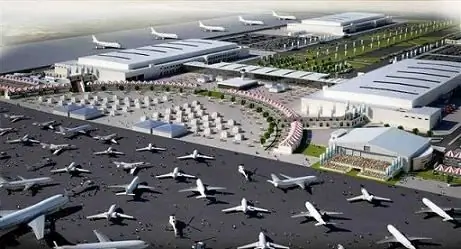- Author Harold Hamphrey [email protected].
- Public 2023-12-17 10:06.
- Last modified 2025-01-24 11:10.
The railway station is the place that most travelers and city guests meet, and therefore it can also be attributed to those attractions that are the hallmark of any locality. Each railway terminal is different and unique in some way. We will look at the railway station in Minsk: how it was once and how it has become now.

First Minsk Station
The history of the Minsk railway terminal dates back to November 16, 1871. It was then that the official opening of the Minsk station on the Moscow-Brest railway took place.
By the way, now few people know the fact that there were two railway stations in the history of Minsk. And the current one is completely different from the place where its predecessor was located. The first station was located where the University of Culture and Arts is currently located. It was then called Brest, however, after some time it was renamed Aleksandrovsky. Just this station received the first railway trains with passengers. And then it was here that suchfamous people like Emperor Nicholas II, Joseph Vissarionovich Stalin and other famous people. This railway station in Minsk functioned until 1928, after which it was closed, and during the Great Patriotic War in 1941 there was a fire there, the building burned to the ground and was no longer restored. That's all for the first railway terminal in Minsk.
History of the current station
The current railway station in Minsk dates back to 1873. It was built on the new Libavo-Romenskaya railway. At first it was called Vilensky or Libavo-Romensky. It was built of wood, and for twenty-five years it remained so. Only in 1898 the building underwent a major restructuring, which was carried out with the use of stone. Then the appearance of the building radically changed. It looked very beautiful, elegant and picturesque, in the form of a tower with two fabulous turrets in the center.

Unfortunately, during the war between the USSR and Poland, the building received significant damage and was later rebuilt. A second floor appeared, which housed a recreation room and administrative offices.
Modern terminal
In 1940, the railway station in Minsk completely lost its original appearance. Of the architectural styles at that time, neoclassicism was preferred, and it was in this style, according to the project of the architect I. Rochanik, that the general restructuring of the building was carried out. The lightness and airiness of the building disappeared, it was replacedheavy and strict rectilinear outlines.
During the Great Patriotic War, the terminal was significantly damaged, but in 1949 it was restored in the same neoclassical style. In the seventies, it became finally clear that the building needed reconstruction, as passenger traffic increased significantly and the station could no longer cope with it. But only in 1992 a competition was held to rebuild the building, and the project of famous architects Vinogradov and Kramarenko won.
At that time, there were significant problems with funding, the implementation of the project was delayed. Construction was completed only in 2001. You can see a photo of the Minsk railway station in our article.

As you can see, they did not save money on the restoration of the terminal, and it turned out well. French stained glass windows, Spanish granite - everything was done to the highest standard. Now the Minsk railway station is a true decoration of the city.
Infrastructure and passenger flow
Address of the Minsk railway station: Privokzalnaya Square, 3. This is a giant reinforced concrete complex with the most modern finishes. It is one of the largest in Europe and can accommodate more than seven thousand passengers at the same time. Near the main entrance there is a tourist office. On all floors of the building there are cafes, many retail outlets, as well as currency exchange offices. Under the complex is the longest underground passage. Its length is 250 meters, it connects Privokzalnaya Square with the Druzhnaya bus station.






